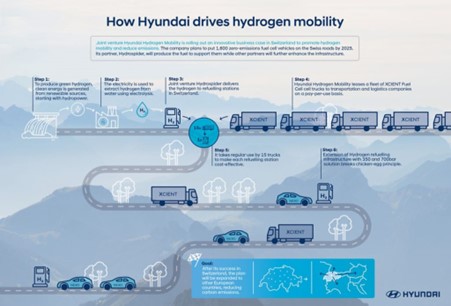Rising fuel prices and greener policies have pushed electric vehicles to the forefront in recent years. And closer attention is now turning to HGVs, as manufacturers face a predicament over which fuel option is the best long-term solution for net-zero HGVs. Government regulatory changes, in addition to B2B and B2C customers’ demands for greener transportation, has meant the transport and logistics industry must adapt and rapidly decarbonise.
Currently, there is an ongoing discussion as to whether hydrogen could be a potential contender when it comes to fuelling lorries as opposed to direct electrification. In fact, hydrogen has been predicted as the likely champion in the UK’s hydrogen vs. electric truck battle. Hydrogen offers many advantages to make emissions-free road freight a reality for HGVs. In other countries, corporations like Mercedes-Benz have gone down the route of electric powered lorries, whilst others like Hyundai Motor, DAF and Toyota have opted for hydrogen-powered trucks. And in the UK, Tevva made history back in July, launching the first hydrogen fuel cell-supported HGV in the country.
In this article, we’ll discuss the benefits of hydrogen-powered lorries, and the differences it has to electric-powered lorries, to determine if hydrogen could be a sustainable fuel source for commercial fleets.

To make hydrogen fuel, you can either electrolyse water using electricity, or through reforming methane, sourced from either natural gas or biomass. Once the methane reforming has taken place, the carbon dioxide that results from it can be isolated so that it doesn’t go into the atmosphere – this type of technology is in the early stages of implementation in the UK.
Using hydrogen as fuel is one of the greenest options for vehicles, since its only tailpipe emission is heated water vapour. It has been utilised safely in buses and other vehicles in many other countries for many years and has a higher energy density than lithium-ion batteries and diesel. And it’s because of these factors, that hydrogen has become an attractive option for use in larger, commercial vehicles.
Hydrogen as a fuel source offers the following benefits:
There are two ways hydrogen can be used to power an HGV:
An alternative to hydrogen power is battery electric power, which has been a popular choice in the domestic and light goods vehicle market. It’s a credible approach for decarbonising long-haul road freight, but the larger a vehicle gets – and the more time needed for running the vehicle – the more hydrogen holds more of an advantage. The issue with using battery electric-powered lorries comes back to one key factor – energy density. In order to match the weight of HGVs, more battery units can be added to the design to increase the available power. However, more cells also equates to more expense in already profit-challenged vehicles. Hydrogen gas is more than 100x as energy-dense as a lithium-ion battery, and hydrogen lorries designed by the likes of Nikola and Hyzon are likely to offer at least double the energy density of battery-powered systems, as well as reducing purchase costs down by more than 70% over the next decade.
With electric power, technical performance can struggle for HGVs. Hydrogen fuel cells offer more energy storage density, as well as greater driving range, reduced weight, and a shorter recharging time. Therefore, it could be argued that battery electric-powered HGVs are not as economic or sustainable as a power solution when looking to reduce carbon emissions in such vehicles.
Since hydrogen fuel cells are in a much earlier stage of development than lithium-ion batteries, the cost of this type of technology will be steeper over the next few years than it is for electric batteries. However, once the cost of fuel cells and liquification technology falls, the capacity of hydrogen tanks will allow for a lower cost of ownership for commercial fleets. In fact, due to falling costs in hydrogen fuel and subsidies, the parity between fuel cell trucks and fossil-powered HGVs could be reached in cost of ownership terms by 2026. This will lead to a rapid uptake in purchases and deliveries prior to 2035, where it’s estimated that 1.5 million fuel cell trucks and buses will be delivering goods and transporting passengers globally, followed by an exponential increase to approximately 24.7 million by 2050.
Hydrogen being utilised as a fuel source for HGVS will play a vital role in helping us to decarbonise the transport and logistics industry. In the UK, HGVs like Tevva’s hydrogen truck, will be crucial to accomplishing the government’s emissions reduction plans that aim to tackle climate change. That’s not to say that going down the route of battery electric-powered HGVs is not a credible approach – but there are some advantages that could potentially give hydrogen the upper hand in the coming future.
If you’d like to talk to us more about your fleet and how we can help, call us on 0808 178 9977 or chat to one of our agents right now.